|
|
|
Sort Order |
|
|
|
Items / Page
|
|
|
|
|
|
|
| Srl | Item |
| 1 |
ID:
159867
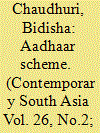

|
|
|
|
|
| Summary/Abstract |
The burgeoning influence of liberal market economy coupled with a ‘good governance’ paradigm across post-communist and post-colonial states emphasizes a market concept of equality, while turning ‘citizens’ into ‘customers’. This trend has been further accentuated by the massive inlets of Information Communication Technologies into governance mechanisms having a significant impact on the ways of governmentality and thereby on the substance and processes of documenting citizenship. It is in this wider context of intersecting economic and political changes that this paper captures the shifting regimes of citizenship in India as manifested through the processes of Unique Identification, or Aadhaar scheme, an initiative by the Government of India that seeks to give every Indian resident a unique identity documentation. Although Aadhaar does not authenticate citizen identity, nonetheless, in its promise to build a ‘national grid’ of identity information infrastructure, it indicates a meta-structure of a new inclusion/exclusion paradigm of citizen formation in India that appears to reinvent early liberal values of civic republicanism based on property rights. Rather than assessing the merits of this scheme, this paper demonstrates how new technologies of governmentality could impact the citizenship regime in India while keeping with the demands of a growing neo-liberal political economy.
|
|
|
|
|
|
|
|
|
|
|
|
|
|
|
|
| 2 |
ID:
133106


|
|
|
|
|
| Publication |
2014.
|
| Summary/Abstract |
The last two decades of economic decline in Africa have drawn attention to the crisis of masculinities, to "failed men" unable to build kinship networks and to "violent men" who damage social networks whilst competing for scarce resources. This article argues that a fragmented, neo-liberal society also produces new patterns of patriarchal aggrandisement. Focusing on Johannesburg's minibus-taxi industry, it shows how large informal sector activities are structured through kinship networks that in turn give rise to modes of masculinity seeking to control these networks. Johannesburg's minibus-taxi business is dominated by retrenched labour migrants, who moved into the transportation sector in the 1980s and 1990s at a time of industrial decline. It thus offers a case study of the changing patterns of accumulation and household formation in a social landscape where kinship ties continue to constitute the key relationships of obligation and support. Drawing on three-dozen core interviews with Zulu-speaking taxi owners and transporters, this article demonstrates that the taxi owner and the taxi boss are men to be emulated, but that the relationships between "big men" and "failed" or "violent" men are uncomfortably close.
|
|
|
|
|
|
|
|
|
|
|
|
|
|
|
|
| 3 |
ID:
167056


|
|
|
|
|
| Summary/Abstract |
After painful reform and restructuring of post-1997 financial crisis, many scholars equated South Korea’s ‘post-developmental state’ with neo-liberal state. However, in doing so, they ignored South Korea’s lasting legacy of interventionist ‘developmental state’ that led nation’s miraculous transformation from a poor agrarian society to a prosperous industrial economy. This article stresses that South Korea indeed tried to adopt some of the policy prescriptions suggested by neo-liberal ideas but moving beyond the dictates of neo-liberalism it also strengthened state capacity to augment non-market mechanisms.
|
|
|
|
|
|
|
|
|
|
|
|
|
|
|
|
| 4 |
ID:
192891
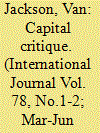

|
|
|
|
|
| Summary/Abstract |
Advocates of progressive political economy agree that the neo-liberal economic order has worsened environmental degradation, worker precarity, and oligarchy, but what are the alternatives? This article relates left-progressive discourses about concrete approaches and policy ideas to implications for the global economic order. While progressives explicitly seek a more social democratic global order, the various policy initiatives in the progressive imaginary implicitly involve approaches to order-building that are in scarcely acknowledged competition with one another. While neo-Keynesianism, justice for the Global South, a Global Green New Deal, and degrowth are all anti–neo-liberal approaches that pursue the same broad aims—reducing inequality within the Global North, raising standards of living and buffering structural violence in the Global South, and responding to the climate crisis—these goals potentially exhibit the tensions of a trilemma.
|
|
|
|
|
|
|
|
|
|
|
|
|
|
|
|
| 5 |
ID:
086411


|
|
|
|
|
| Publication |
2009.
|
| Summary/Abstract |
A conventional technocratic wisdom has begun to form that blames the failure of the US led invasion of Iraq on the small number of American troops deployed and the ideological divisions at the centre of the Bush administration itself. This paper argues that both these accounts are at best simply descriptive. A much more sustained explanation has to be based on a close examination of the ideological assumptions that shaped the drafting of policies and planning for the aftermath of the war. The point of departure for such an analysis is that all agency, whether individual or collective, is socially mediated. The paper deploys Antonio Gramsci's notion of 'Common Sense' to examine the Bush administration's policy towards Iraq. It argues that the Common Sense at work in the White House, Defence Department and Green Zone was primarily responsible for America's failure. It examines the relationship between the 'higher philosophies' of both Neoconservatism and Neo-Liberalism and Common Sense. It concludes that although Neoconservatism was influential in justifying the invasion itself, it was Neo-Liberalism that shaped the policy agenda for the aftermath of war. It takes as its example the pre-war planning for Iraq, then the disbanding of the Iraqi army and the de-Ba'athification of the Iraqi state. The planning and these two decisions, responsible for driving Iraq into civil war, can only be fully explained by studying the ideology that shaped them. From this perspective, the United States intervention in Iraq was not the product of an outlandish ideology but was instead the high water mark of post-Cold War Liberal interventionism. As such, it highlights the ideological and empirical shortcomings associated with 'Kinetic Liberalism'.
|
|
|
|
|
|
|
|
|
|
|
|
|
|
|
|
| 6 |
ID:
132419
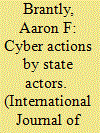

|
|
|
|
|
| Publication |
2014.
|
| Summary/Abstract |
Covert action is as old as political man. The subversive manipulation of others is nothing new. It has been written about since Sun Tzu and Kautilya. People and nations have always sought the use of shadowy means to influence situations and events. Covert action is and has been a staple of the state system. A dark and nefarious tool often banished to philosophical and intellectual exile, covert action is in truth an oft-used method of achieving utility that is frequently overlooked by academics. Modern scholars contend that, for utility to be achieved, activities such as war and diplomacy must be conducted transparently. Examined here is the construction of utility for a subset of covert action: cyber attacks.
|
|
|
|
|
|
|
|
|
|
|
|
|
|
|
|
| 7 |
ID:
191720


|
|
|
|
|
| Summary/Abstract |
Policy hybrids, which combine marketizing and liberalizing reforms with social welfare programmes and state support to boost domestic production, are fast becoming the norm globally. How are neo-liberal and national-developmentalist agendas reconciled as governing practices, and what are their national and international outcomes and implications? This article focuses on the understudied case of India, arguing that a paternalist political rationality, which melds paternalist logics in neo-liberalism and the government's Hindutva civilizationalist politics, underpins its flagship economic policy, the Atmanirbhar Bharat Abhiyan (Self-reliant India Mission). This policy, through production-linked incentives, aims to boost Indian manufacturing. India has benefited from a global push to diversify supply chains and forge new geopolitical partnerships, such as the Quad, to undermine China's manufacturing dominance and geopolitical assertiveness. Yet, its current approach consolidates the dominance of large firms, producing an elitist political economy, and does not address structural weaknesses through public investment in areas like research and education. This has implications for India's development, global trade and geopolitics. These arguments are made by identifying the paternalist logics in the theories and practices of neo-liberalism, and in Hindutva civilizationalist politics; assessing the aims of the Atmanirbhar Bharat Abhiyan as elaborated by government officials; and evaluating the early outcomes of production-linked incentive schemes.
|
|
|
|
|
|
|
|
|
|
|
|
|
|
|
|
| 8 |
ID:
148681


|
|
|
|
|
| Summary/Abstract |
The European Project is currently experiencing the most serious crisis in its sixty year existence. Past crises have produced transformational leaders who used them to build more Europe. Today transformational leadership at the European level has been replaced with transactional and laissez faire leaders and is being challenged by charismatic populist ‘strong men’ who oppose more Europe. The structure of the EU, the rise of new media, the large flows of immigrants and refugees combined with economic stagnation and the decline of traditional ideologies have undermined the ability of leaders to shape effective policies. Emerging leaders will be grounded in the nation state and in a more Gaullist Europe.
|
|
|
|
|
|
|
|
|
|
|
|
|
|
|
|
| 9 |
ID:
134378


|
|
|
|
|
| Summary/Abstract |
While the rise of “resilience” as a strategic concept has been widely noted, critical security scholars have given it a frosty reception, viewing it as a vehicle and multiplier of neo-liberal governmentality. This article acknowledges that resilience does form part of a neo-liberal security regime, but argues that a shift from defense to resilience is not devoid of critical potential, and develops recent calls for critique to be made more context specific. It begins by arguing that blanket condemnation of resilience is part of a wider tendency to apply Foucault's “governmentality” concept as a particular global form of power, rather than as an empirically sensitive analytic framework open to different configurations of power. It then shows how resilience also forms part of a strategy to manage uncertainty—particularly in relation to coping with global environmental risks—which directly challenges neo-liberal nostrums. A comparison with the concept of “defense” is made, arguing that resilience, while problematic for other reasons, potentially avoids the pernicious us-them logic, exceptionalism, and short-termism characteristic of defense strategies.
|
|
|
|
|
|
|
|
|
|
|
|
|
|
|
|
| 10 |
ID:
101742
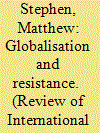

|
|
|
|
|
| Publication |
2011.
|
| Summary/Abstract |
This article develops and applies the role of 'common sense' in a Gramscian theory of transnational counter-hegemony. Building on recent interpretative literature on the alter-globalisation movement, it applies this framework to then evaluate empirically the impact of the alter-globalisation movement on the realm of global 'common sense' understandings of the world in the period 2002 to 2007. It shows that there is little empirical support for the notion that the alter-globalisation movement effected a legitimation crisis for neo-liberalism as a hegemonic project on a global scale. Instead, a more ambivalent and potentially reactionary situation amongst collectively held norms is revealed. This indicates the shortcomings of the alter-globalisation movement as a coalition of social forces capable of mounting an ideological attack on neo-liberalism and forging a new intellectual-moral bloc.
|
|
|
|
|
|
|
|
|
|
|
|
|
|
|
|
| 11 |
ID:
072698


|
|
|
|
|
| Publication |
2006.
|
| Summary/Abstract |
Justin Rosenberg gives a very interesting account of the conditions that produce the globalization literature and provides a compelling critique of the theory itself. I want to supplement this with an account of the social conditions that sustain such views. In short, my project is to relate globalization theory to contemporary forms of governmentality and to neo-liberalism in particular. Ultimately this leads me to slightly different conclusions. That is, not the death of globalization theory, but the way it interacts with and is sustained by contemporary practices, techniques and technologies of governmentality.
|
|
|
|
|
|
|
|
|
|
|
|
|
|
|
|
| 12 |
ID:
107199
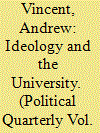

|
|
|
|
|
| Publication |
2011.
|
| Summary/Abstract |
Ideology underpins recent transformations of British universities; it forms an unquestioned backdrop to policy-making. The ideology at issue is a market-based neo-liberalism-accompanied by a doctrinaire private-sector managerialism. Universities employing this ideology envision it as common sense. The ideology is thus not proselytised, but rather structures the vernacular of university speech. In reality it is a highly politicised ideology masquerading as a managerial reality. Its effect on universities has been profoundly destructive. The dignified public good of higher education has now become a huckstering marketised mechanism. What is so perplexing is the quiescence of universities. The ideology is so hegemonic that it appears exempt from criticism. University administrators are now quite unapologetic ideological functionaries and we need to relearn how to criticise those who manage us. Ultimately no ideology lasts, this present one will be supplanted, the question is what level of damage to civil and intellectual life will it inflict?
|
|
|
|
|
|
|
|
|
|
|
|
|
|
|
|
| 13 |
ID:
101314
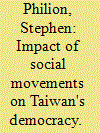

|
|
|
|
|
| Publication |
2010.
|
| Summary/Abstract |
This article discusses and critiques the four articles that comprise this volume on Taiwan's social movement and democratization. I argue that the four articles suggest that while Taiwan's social movements have made a clear impact on Taiwan's democratization, they remain challenged by the neo-liberal orientation of elected governments, in both KMT and DPP forms. The article provides brief comparison to East Asian NICs and Western experiences with social movements. A strength of the articles is their attention to the complex ways social movements and democratization have impacted each other for the past two decades, with attention to unintended consequences. It concludes with some thoughts on the implications of how nationalism and globalization will continue to shape the potential of social movements in Taiwan.
|
|
|
|
|
|
|
|
|
|
|
|
|
|
|
|
| 14 |
ID:
165083


|
|
|
|
|
| Summary/Abstract |
In our paper, we present an empirical study that tests claims regarding the purported impact of economic globalization on business elites, namely that elites become increasingly transnational in their careers and life style and neo-liberal in their action orientations. We draw upon the results of a study that (a) tapped life course data for 100 current top managers in India and (b) implemented a collective mindset analysis using in-depth interviews that were conducted in India with retired and serving senior business managers. Our findings indicate that endogenous institutions have an important and enduring role to play in the shaping of careers, as well as generating embedded cognitive frameworks. Drawing from this exploratory study, we propose a set of hypotheses and a research agenda to argue that socio-cultural mechanisms of selection and socialization must be taken into account in discussions regarding the emergence of a global corporate elite.
|
|
|
|
|
|
|
|
|
|
|
|
|
|
|
|
| 15 |
ID:
193202


|
|
|
|
|
| Summary/Abstract |
The paper interrogates the paradox of persistent youth unemployment amid an upswing of impressive economic growth after Neo-liberal reforms in Uganda. The government of Uganda undertook targeted interventions to ameliorate youth unemployment, which escalated. Why was the growing economy failing to absorb labour? Why were the interventions failing? We argue that the interplay of the skewed neo-liberal and global architecture, decline of traditional labour absorbing sectors, and the debilitating syncretic ‘informal’ sector constrained sustainable youth employment and deflated interventions. The paper opines that Uganda’s neo-liberal capitalism was unique, as it was structured in a way that did not enhance domestic actors and sectors, which would have increased sustainable labour absorption and utilisation. Otherwise, Uganda’s celebratory growth was largely aid-driven and in the controversial and constrained informal sector, limited service ‘enterprises’ and import consumerism, which undermined domestic productivity and employability. Neo-liberalism and the reconstituted state did not align the domestic and global economic structures for meaningful employment. Unemployment spiralled into the socio-political landscape, while youth agency strived for better positioning.
|
|
|
|
|
|
|
|
|
|
|
|
|
|
|
|
| 16 |
ID:
156660
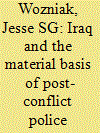

|
|
|
|
|
| Summary/Abstract |
Existing scientific literature on post-conflict police reconstruction is largely divided between two camps. The first, and most widely employed in practice, can be termed a neo-liberal model, which argues progress comes through technological and organizational sophistication delivered by Western officials. This neo-liberal model has been the guiding principle of the reconstruction of the Iraqi state and police force. However, many scholars have argued this model is woefully inadequate for post-conflict reconstruction and have instead developed an alternative approach which can be termed a reflexive model. Similar to what is known as fourth generation peacebuilding in the International Relations literature, the reflexive model stresses building relationships with local stakeholders and relying on indigenous knowledge to guide post-conflict reconstruction. Drawing from 48 intensive interviews, 87 qualitative surveys, and six months of ethnographic examination of an Iraqi police training academy, this article argues that both the neo-liberal and reflexive models suffer from ignoring the material basis of reconstruction. This article employs the term ‘material’ in the theoretical sense; while police reconstruction programs spend significant effort on reshaping the ideologies of police, few address the real conditions police face, from the necessary levels of funding and equipment in their training centers, to basic concerns such as adequate pay to draw qualified applicants and prevent corruption. This study examines how economic inequality affects the ‘other side’ of conflicts, the security sector. The central finding is that the material deprivation experienced by Iraqi police has resulted in an underqualified force consisting of uninterested officers whose capacity and skill deficits have fed directly into the rise of powerful non-state organizations such as the Islamic State. This article explicates a central underlying cause of the problem with the reconstruction of the Iraqi police specifically and the larger case of neo-liberal post-conflict police reconstruction generally.
|
|
|
|
|
|
|
|
|
|
|
|
|
|
|
|
| 17 |
ID:
077883


|
|
|
|
|
| Publication |
2007.
|
| Summary/Abstract |
Claims by liberal states to be furthering democratic values and material prosperity are being contested due to the manner in which liberal states are attempting to provide for their own security, to the way in which democracy is being more forcefully projected onto the international order, and to the dislocations and inequality associated with global capitalism. The appeal of liberalism as a form of political and economic organization has declined even as its tenets have come to be taken for granted by virtue of their grounding in scientific reasoning. A sustainable resolution to the crisis of legitimacy of the liberal state requires the internal regeneration of the liberal state itself, a renewed commitment to dialogue in multilateral institutions, and a persuasive revitalization of the claims liberal states make that render their example attractive to others
|
|
|
|
|
|
|
|
|
|
|
|
|
|
|
|
| 18 |
ID:
161034
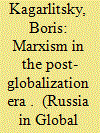

|
|
|
|
|
| Summary/Abstract |
It would be strange, to say the least, to speak about Marxism as a progressive or even influential theoretical school in Eastern Europe after the collapse of the Soviet bloc in 1989-1991. Marxist ideas have come to be associated with the repressive practices of the totalitarian Stalinist era, the failed Soviet economy and the conservative, nostalgic views of the older generation and a small segment of the youth that failed to integrate into the market economy.
|
|
|
|
|
|
|
|
|
|
|
|
|
|
|
|
| 19 |
ID:
081985
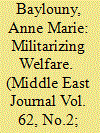

|
|
|
|
|
| Publication |
2008.
|
| Summary/Abstract |
Jordan's seemingly successful economic and political reforms have been used to advertise the American vision of societal transformation in the Middle East. The imposition of neo-liberal economic policies removed a key source of welfare for the populace, leaving the regime without a secure base of support. Economic liberalization led to a radical change in the regime's base of support, marginalizing the previous regime backers - the East Bank population - and replacing them with a strengthened military, formerly only part of the regime's support. Initial economic liberalization was a critical juncture when differing outcomes were possible. The 1990s set the institutions and state policies that persisted after these extreme hard times passed. An analytical focus on state social provisioning demonstrates the changed social base of the Jordanian regime and the groups effectively disenfranchised by the new arrangements. The military and security services are the only sector growing in structural adjustment. Alongside decreasing social welfare allocations in general, the military's budgets are increasing and the military diversifying into sub-contracting and new economic enterprises. Militarized liberalization serves as an alternative model for Middle East regimes, one that can furnish the foundation for semi-authoritarianism into the near future. This changing social base of the regime, illuminated through an examination of social welfare, must be recognized when tackling the perennial question of a democratic deficit in the Middle East
|
|
|
|
|
|
|
|
|
|
|
|
|
|
|
|
| 20 |
ID:
188401


|
|
|
|
|
| Summary/Abstract |
Bangladesh has been following the neo-liberal economic model since the early 1980s. Manifestly, consecutive state authorities have failed to reduce the inequalities between different social groups in the last forty years. This article examines how the reform policies resulting from the liberalisation and privatisation of Bangladesh’s economy have created avenues for a handful of business elites to surge and control its economic and political decision-making mechanisms. It also illustrates the impacts of neo-liberal reforms on the socio-economy and health-care sector of the country. Finally, this paper argues that the consequences of pro-market reforms have played a significant role in weakening the ability of the state to respond appropriately to the ongoing COVID-19 pandemic in Bangladesh as the government is compelled to maintain its nexus with the business elites rather than focus on the well-being of all its citizens.
|
|
|
|
|
|
|
|
|
|
|
|
|
|
|
|
|
|
|
|
|